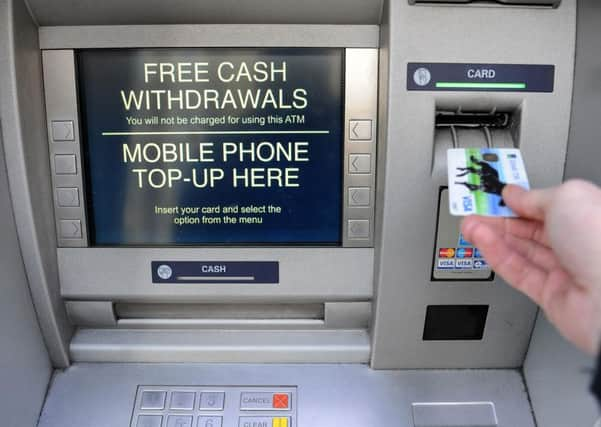Overdraft charges prove more costly than payday loans


Research from Which? concluded that consumers needing as little as £100 could be charged up to 12.5 times more by major high street banks than the Financial Conduct Authority (FCA) allows payday loan companies to charge, when borrowing the same amount for the same period.
In 2015, the FCA introduced a cap on high cost short-term credit to protect consumers from excessive fees charged by payday loan companies, but Which? found that unarranged overdrafts can be much more costly when people are borrowing for the short-term.
Advertisement
Hide AdAdvertisement
Hide AdA Which? spokesman said: “Which? compared the cost of borrowing £100 for 28 days and found that charges at some high street banks were as much as £90, up to four times higher than the maximum charges of £22.40 on a payday loan.
“The charges could be even higher if interest payments or possible unpaid item fees are included, or the money is borrowed over two bank monthly charging periods, because the maximum charge relates to the bank’s monthly charging period and not the borrowing period.
Which? is calling for unarranged overdraft charges to be set at the same level as arranged overdraft charges. Which? also wants the FCA to review overdraft charges in the context of other forms of credit and crackdown on punitive fees.
Alex Neill, the director of policy and campaigns at Which?, said: “People with a shortfall in their finances can face much higher charges from some of the big high street banks than they would from payday loan companies.
Advertisement
Hide AdAdvertisement
Hide Ad“The regulator has shown it’s prepared to take tough action to stamp out unscrupulous practices in the payday loans market, and it must now tackle punitive unarranged overdraft charges that cause significant harm to some of the most vulnerable customers.”
An FCA spokesman said: “We have no comment at this stage.”
Responding to the report, a Barclays spokesman said: “Significant changes to our overdraft structure and charges were implemented in June 2014. We introduced new text alerts, grace periods and buffer zones to help customers manage their finances and avoid fees.” Barclays does not provide unarranged overdrafts. Any emergency borrowing must be pre-agreed.
A spokesman for HSBC said the bank would always encourage customers to get in touch if they needed to arrange a formal overdraft or an extension to their existing formal limit.
The spokesman added “Where customers do contact us first the charges would be limited to debit interest only and for our bank account customers the total charge for a debt of £100 for 28 days would be £1.40.”
Advertisement
Hide AdAdvertisement
Hide AdA Lloyds spokesman said unplanned overdrafts are designed for occasional spending rather than long-term borrowing, “and being in an unplanned position for a sustained amount of time is not representative of typical current account behaviour”.
“The vast majority of our customers who use their overdraft remain within their planned limit in an average month, and the process to agree a new or revised limit is quick and simple,’’ the Lloyds spokesman said.
A Nationwide spokesman added: “We would always encourage our customers to pre-arrange a suitable overdraft to ensure that any borrowing on their current account fully meets their needs. Only a small number of our customers use unarranged overdrafts.”
Responding to the Which? report, an RBS spokesman said “We encourage all of our customers to contact us if they are going to enter an unarranged overdraft, regardless of the amount or the length of time.
Advertisement
Hide AdAdvertisement
Hide Ad“This is an expensive method of borrowing and there could be a number of alternative solutions.”
A Santander spokesman said the bank provided a range of services to help its customers manage their money. These include online and mobile banking, email and text alerts which can be set to warn of an overdraft or unpaid transaction, a £12 overdraft buffer, a grace period of until 4pm to clear an overdrawn balance, and 22 days’ notice of account charges.”